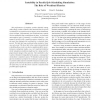Free Online Productivity Tools
i2Speak
i2Symbol
i2OCR
iTex2Img
iWeb2Print
iWeb2Shot
i2Type
iPdf2Split
iPdf2Merge
i2Bopomofo
i2Arabic
i2Style
i2Image
i2PDF
iLatex2Rtf
Sci2ools
117
click to vote
IPPS
2006
IEEE
2006
IEEE
Instability in parallel job scheduling simulation: the role of workload flurries
The performance of computer systems depends, among other things, on the workload. This motivates the use of real workloads (as recorded in activity logs) to drive simulations of new designs. Unfortunately, real workloads may contain various anomalies that contaminate the data. A previously unrecognized type of anomaly is workload flurries: rare surges of activity with a repetitive nature, caused by a single user, that dominate the workload for a relatively short period. We find that long workloads often include at least one such event. We show that in the context of parallel job scheduling these events can have a significant effect on performance evaluation results, e.g. a very small perturbation of the simulation conditions might lead to a large and disproportional change in the outcome. This instability is due to jobs in the flurry being effected in unison, a consequence of the flurry’s repetitive nature. We therefore advocate that flurries be filtered out before the worklo...
| Added | 12 Jun 2010 |
| Updated | 12 Jun 2010 |
| Type | Conference |
| Year | 2006 |
| Where | IPPS |
| Authors | Dan Tsafrir, Dror G. Feitelson |
Comments (0)

